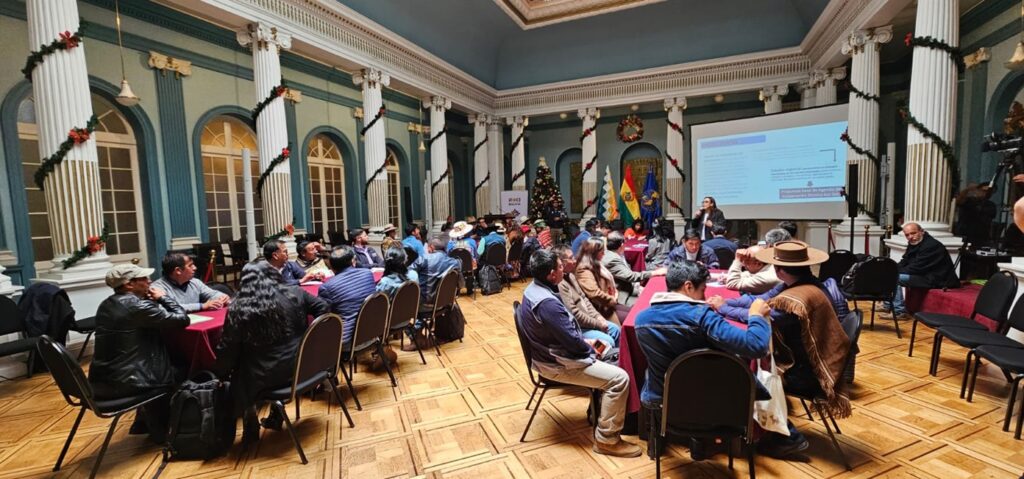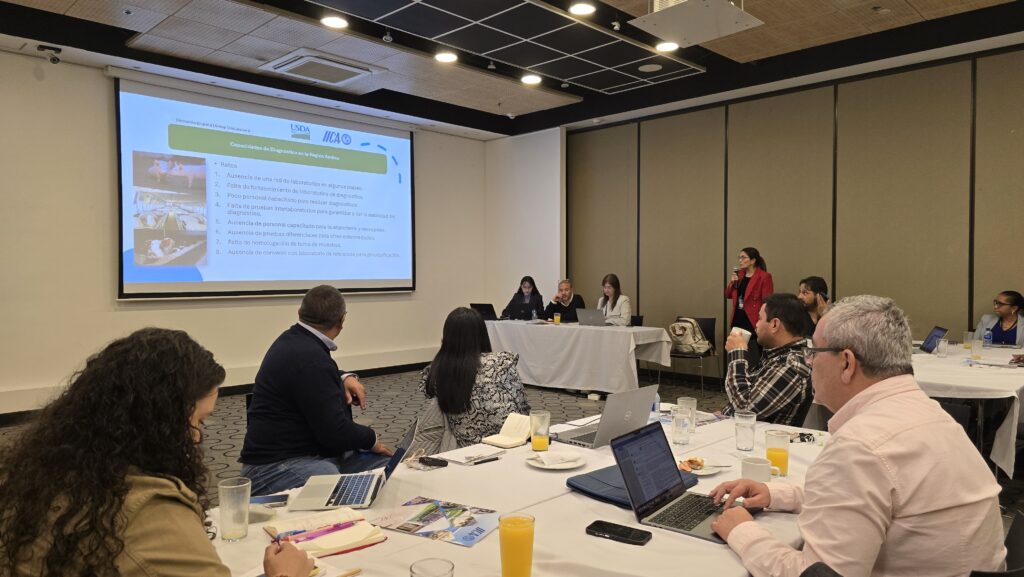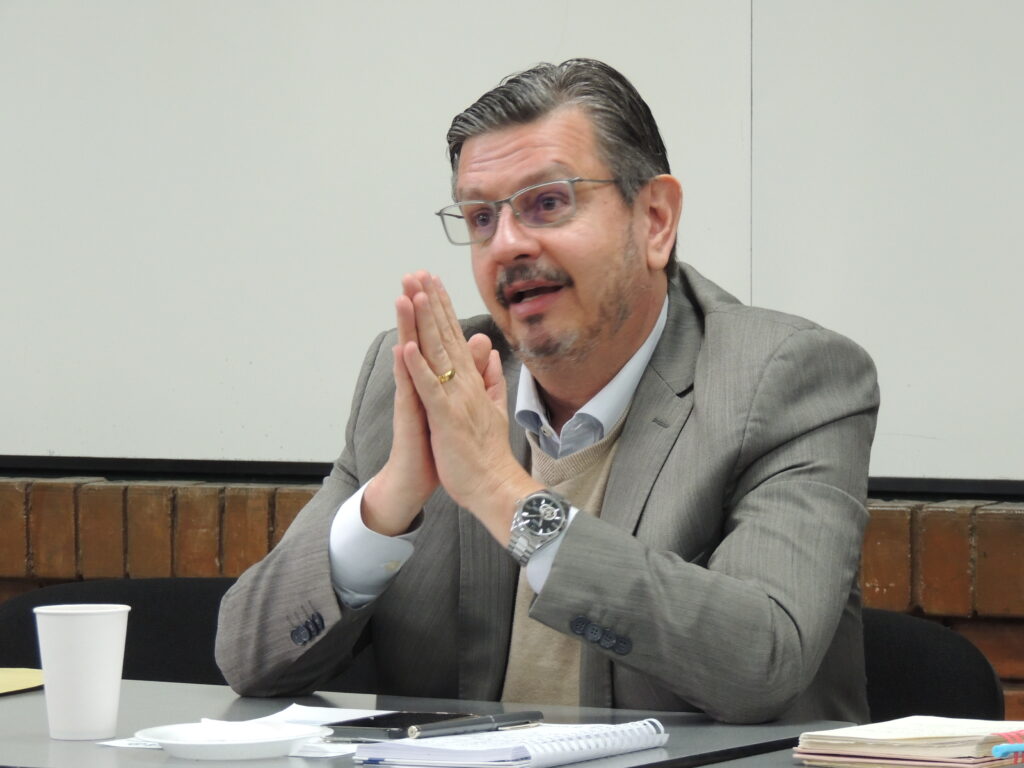En reunión con el Director General del IICA, Manuel Otero, y con el Representante del organismo en México, Diego Montenegro Ernst, el Director en Jefe del Senasica, Javier Calderón Elizalde, subrayó que esta alianza ha sido estratégica para proteger al sector agropecuario mexicano y de todo el continente americano, y para fortalecer la producción e intercambio seguro de alimentos sanos e inocuos.
Ciudad de México, 9 de marzo de 2023 (IICA) – El Servicio Nacional de Sanidad, Inocuidad y Calidad Agroalimentaria (Senasica) de México destacó que la colaboración técnica de más de 30 años del Instituto Interamericano de Cooperación para la Agricultura (IICA) ha contribuido a posicionar al país como un referente mundial en temas sanitarios.
En reunión con el Director General del IICA, Manuel Otero, y con el Representante del organismo en México, Diego Montenegro Ernst, el Director en Jefe del Senasica, Javier Calderón Elizalde, subrayó que esta alianza ha sido estratégica para proteger al sector agropecuario mexicano y de todo el continente americano, y para fortalecer la producción e intercambio seguro de alimentos sanos e inocuos.
Actualmente, México cuenta con un estatus sanitario internacional privilegiado, pasando en dos décadas de ser de un país deficitario a ser una potencia exportadora de alimentos seguros, puntualizó Calderón.
En ese sentido, el titular de Senasica sostuvo que ante la competitividad del comercio de alimentos, los países deben encaminarse hacia una mejora constante de los procesos productivos para garantizar el abasto de alimentos a precios accesibles y coadyuvar a que sus productores, sobre todo los de pequeña escala, puedan incursionar en más y mejores mercados.
También refirió que el programa Moscas del Mediterráneo (Moscamed) que opera el organismo de la Secretaría de Agricultura y Desarrollo Rural (SADER) en la frontera sur es ejemplo de la eficiencia que han logrado el Senasica y el IICA, particularmente en la ejecución de acciones contra plagas que podrían dañar la agricultura de México y del continente.
“Las preocupaciones sanitarias de México no son aisladas, las plagas y enfermedades no conocen fronteras, es por ello que, al proteger la producción agroalimentaria de México, protegemos la de toda la región”, dijo Calderón Elizalde.
El funcionario explicó también que con el acompañamiento del IICA los técnicos mexicanos comparten sus conocimientos con homólogos de otros países, con el fin de reforzar sus barreras de defensa ante riesgos latentes, como la peste porcina africana (PPA), que desde hace más de un año está presente en República Dominicana y Haití, y el Fusarium oxysporum sp. cubense Raza 4 Tropical (Foc R4T), que afecta a Colombia y Perú.
“Los esfuerzos del Senasica para homologar las técnicas de prevención, control y erradicación de plagas y enfermedades no tendrían éxito sin el liderazgo del IICA, que aglutina agendas de 34 países del continente, desde Canadá hasta Argentina y Chile. Tenemos comunicación constante con todos los países hermanos de América, la problemática es grande por lo que los organismos estamos inmersos en el día a día y el IICA tiene esa experiencia para conjuntar esfuerzos”, añadió.
A su turno, el Director General del IICA, Manuel Otero, expresó que durante tres décadas de relación ininterrumpida con México el Instituto ha sido un medio para que la agencia sanitaria del gobierno mexicano brinde el mejor servicio posible al sector productivo y a los consumidores. “El estatus sanitario de México es privilegiado. El desafío es mantenerlo y replicarlo en la región”, apuntó Otero.
El Representante del IICA en México, Diego Montenegro Ernst, precisó que durante 2023 la cooperación con el Senasica se centrará en programas de cooperación técnica con agencias sanitarias como la de California, Estados Unidos, que está interesada en conocer la experiencia de México con el programa Moscamed.
También, adelantó que ejecutarán programas de extensionismo digital, con el fin de facilitar el acceso al conocimiento, la información y las tecnologías agropecuarias a productores, grupos y organizaciones rurales, informando que existen solicitudes de varios países para conocer el Centro de Operaciones de Emergencias Sanitarias (COES) del Senasica, infraestructura mediante la que personal especializado vigila las plagas y enfermedades exóticas alrededor del mundo, brinda información a las áreas técnicas y apoya las labores que realizan los oficiales de inspección fitozoosanitaria en puertos, aeropuertos y fronteras para prevenir su entrada a México.
En el encuentro también participaron el administrador y el coordinador técnico de la Representación del IICA en México, Martin Barajas y José Luis Ayala, respectivamente, y el secretario técnico de los Órganos de Gobierno del Instituto, Héctor Iturbe.
Más información:
Gerencia de Comunicación Institucional
comunicacion.institucional@iica.int










